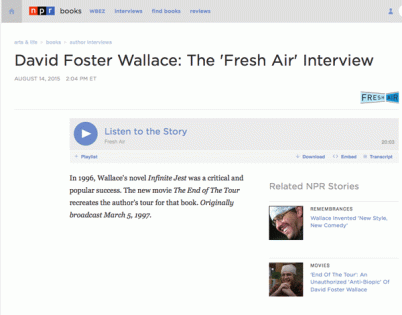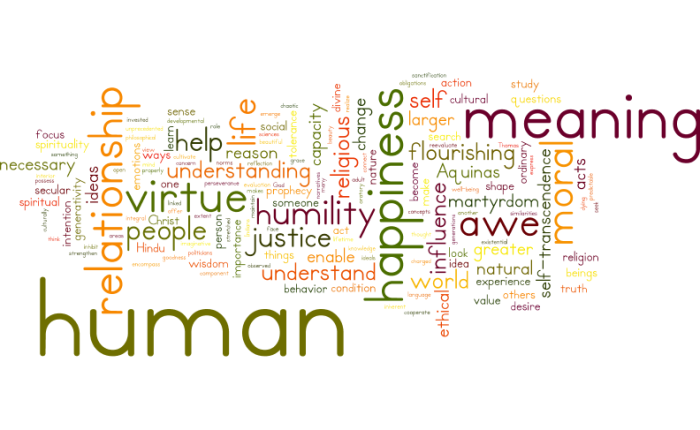After decades of believing happiness could be found by focusing on the self, many of us are now seeking purpose elsewhere. Rejection of personal achievement as the yardstick with which one might measure a successful life began some years ago, but in recent years more and more people seem to feel that a good life requires more than mere personal success. In a 1997 interview with Terry Gross on the NPR show Fresh Air, the fabulously successful young author David Foster Wallace voiced his profound disenchantment with the self-indulgent tendencies of U.S. culture, describing the sense of emptiness he felt he shared with others of his generation: “I was about 30 and I had a lot of friends who were about 30, and we’d all, you know, been grotesquely over-educated and privileged our whole lives and had better healthcare and more money than our parents did. And we were all extraordinarily sad.”
Wallace went on to criticize mainstream culture’s definition of a meaningful life: “[A] successful life is – let’s see, you make a lot of money and you have a really attractive spouse or you get infamous or famous in some way so that it’s a life where you basically experience as much pleasure as possible, which ends up being sort of empty and low-calorie.” Wallace also questioned the connection between individual success as

measured by money and status, and real happiness, happiness which he felt had eluded him despite his enviable achievements: “I guess it sort of depends on what you mean by happiness . . . we sort of knew how happy our parents were, and we would compare our lives with our parents and see that, at least on the surface or according to the criteria that the culture lays down for a successful, happy life, we were actually doing better than a lot of them were. And so why on earth were we so miserable?”
Wallace’s sense that life should be about something greater than individual achievement is reflected in the contemporary idealism of the high-profile actors and music industry stars whose lives are successful by conventional measures, yet who have still felt the need to draw attention to poverty and human suffering throughout the world. It is reflected in the popularity of Rick Warren’s book The Purpose Driven Life, which has sold more than 30 million copies, and whose first chapter begins, “It’s not about you,” and goes on to insist, “The purpose of your life is far greater than your own personal fulfillment, your peace of mind, or even your happiness. It’s far greater than your family, your career, or even your wildest dreams and ambitions.”
This sense that a successful life should be about something greater crops up in the language Karl Moore uses in Forbes magazine to contrast the desire of millennials for meaningful work with the Wall Street generation that preceded them:
“You might remember the bumper sticker, ‘He Who Dies With the Most Toys Wins.’ Fast forward two decades and you notice that Millennials are concerned with other things. Money is important and they do enjoy making it, however, they long to be a part of something bigger than themselves.”
–Karl Moore in Forbes, Oct 2, 2014 “Millenials Work for Purpose, Not Paycheck”
It is present in David Brooks’ criticism of the university in a recent New York Times column about the necessity of teaching students to devote themselves to great things: “Universities are more professional and glittering than ever, but in some ways there is emptiness deep down. Students are taught how to things, but many are not forced to reflect on why they should do them or what we are here for.”
David Brooks, “The Big University,” The New York Times, October 6, 2015
Many of these examples share the notion that happiness in life comes from a sense that one’s life is meaningful, and that meaning derives from having a relationship to something larger than yourself, whether this is a community, a church, or a humanitarian project. “Happiness” and “meaning” are thus interconnected; happiness comes from meaning, which is the sense we have that we are connected to this larger world.
But what motivates us to seek this connection? How do we maintain it once we have it? What larger good, if any, does it express? How do we understand this human striving for good?
Our project has gathered 27 scholars from Philosophy, Psychology, and Religious Studies to look at the ways in which virtue—cultivated strength of character—is not just a matter of having a lovely heart, mind, and will, but a matter of developing these in the context of something bigger and better than one’s own inner world and intimate circle. Building from Aristotle to define virtue and virtuous emotions, many of our scholars use the work of Thomas Aquinas to develop a better understanding of virtue, of the common good, and of a sense of purpose. All of our scholars are interested in understanding various forms of self-transcendence, or devotion to a greater good, and the place of self-transcendent good in leading satisfying lives.
You might wonder how 27 scholars from different disciplines will understand one other, but one of the striking things about this group is the way their research questions already resonate together even at this early stage of inquiry.
While our religious studies people are asking, “Does the human search for truth also make someone open to religious questions?” our philosophers query, “How do ordinary people become virtuous, and how does virtue shape them?” and our empirical psychologists wonder, “Are we fixed adults with little capacity to change, or are we beings who can use experience to increase wisdom and human flourishing?”
We look forward to many conversations about goodness, happiness, and a life worth living over the next twenty-eight months, and beyond. We hope you will frequently visit us here at our blog, as well as in person or via the web at our lectures and events, and we hope the questions we ask here will lead to conversations in your life about happiness, devotion, goodness, self-transcendence, and the essence of meaning.
Jaime Hovey is Associate Program Director for Virtue, Happiness, & the Meaning of Life.
